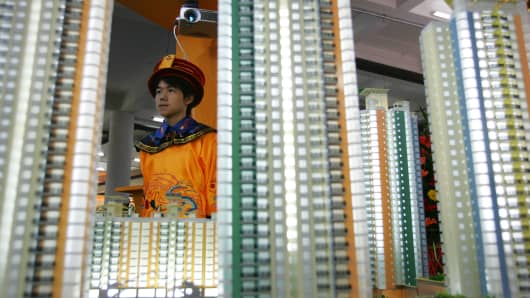China's loose monetary policy and strong pent-up housing demand will drive up home prices in 2013, but government cooling measures, including a wider trial program to tax property owners, will keep the market from running away.
A Reuters latest poll of 11 economists and property market analysts, conducted between May 20-28, predicts an 8.0 percent rise in China's house prices this year, followed by a 3.0 percent increase in 2014.
The forecasts were roughly in line with a previous poll five months ago which showed an increase of 7.0 percent in 2013 and 5.0 percent in 2014.
(Read More: China April Housing Inflation Quickens)
"Sales performance has been pretty good this year, which will drive up prices. And there is also a lot of liquidity in the property market this year," said Luo Yu, an analyst with CEBM in Shanghai.
On a scale of 1 to 10 for house prices, where 1 is seen as extremely undervalued and 10 is extremely overvalued, the median forecast of the respondents was 8.
"China's current home prices have far exceeded a sustainable level that the country's economic fundamentals can support," said Jianguang Shen, chief China economist with Mizuho Securities Asia in Hong Kong.
The country's largest real estate developer, China Vanke, reported a 67.6 percent rise in contracted sales in April from a year earlier.
(Read More: Property Drives Wealth of China's Richest Women)
Even as signs emerged that the broader economy was losing some steam, housing inflation nationwide accelerated to its fastest pace in April in two years and new home prices in Beijing rose 10.3 percent last month from a year earlier.
That came even after fresh tightening measures enacted in March, such as a requirement for higher downpayments and a 20 percent capital gains tax.
"Implementation of the new steps by local governments are soft, and supply is tight in some first-tier cities," said He Tian, an analyst with China Index Academy, which is affiliated with China's largest online real estate company, Soufun Holdings.
(Read More: China Profit Growth Quickens, No Harbinger of Recovery)
If prices keep climbing, China's new premier, Li Keqiang, will have to take more action, although policy options are now limited with economic growth cooling.
Real estate investment accounted for 11 percent of China's gross domestic product in 2012 and affects over 40 other industries.
Eight of the analysts polled said China could widen a trial program taxing owners of spacious or multiple homes, already tested in Shanghai and Chongqing for more than two years.
China's State Council, or cabinet, is still reviewing a list of possible sites, which analysts said could include the cities of Shenzhen, Hangzhou, Nanjing, Changsha and Qingdao.
The National Development and Reform Commission said last week that China would expand the property tax trial this year, but it did not give further details.
(Read More: Outlook for China's Economy Just Keeps Getting Worse)
China's fight against property speculation, heading into its fourth year, has centeredaround reducing financing for buyers and limiting the number of homes people can buy.
However, as the country relaxed monetary policy since last year to rev up economic growth, money has found its way into the real estate sector, instead of supporting the real economy.
The Chinese economy has surprised investors on the downside so far this year, on track to what could be the slowest growth rate in 23 years, and forcing economists to slash their forecasts.
Policymakers face a dilemma: further relaxing monetary policy could mean home prices run out of control, but to press too hard against housing inflation risks collapsing the broad economy.


